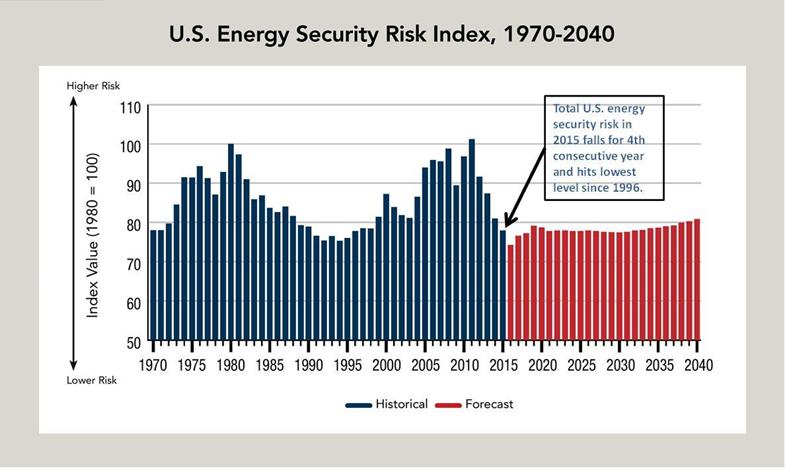A new report produced by the U.S. Chamber of Commerce’s Institute for 21st Century Energy finds that America’s energy security is as its strongest point in two decades thanks to domestic oil and gas production.
The 2016 edition of the Index of U.S. Energy Security Risk, which examined an array of geopolitical, economic, reliability, and environmental risk factors, shows that total energy security risk in 2015 dropped to its lowest level since 1996. “The outlook for U.S. energy security is as bright as it has been since we started measuring it back in 2011,” wrote Karen Harbert, president and CEO of Institute for 21st Century Energy.

Not surprisingly, key infrastructure investments like the Dakota Access Pipeline are critical to domestic energy security and newly-defined role as the world’s leader in oil and gas production. In her opening remarks, Harbert makes clear that the benefits of America’s revolution “are contingent on the ability to move these resources to domestic and global markets” and cautions against the politicization of infrastructure needed to sustain continued growth.
On Dakota Access, the report notes the thorough review the project underwent:
The Dakota Access pipeline will link North Dakota’s oil fields with refineries in the Midwest and Gulf Coast. The project has undergone extensive stakeholder consultation and environmental review, received its national permits, and would run along existing rights of way for a natural gas pipeline and transmissions line. As of this writing, Dakota Access is awaiting a final Army Corp of Engineers easement and is being held up by Keep it in the Ground activists, which means that most North Dakota crude oil will continue to travel by rail.
This is not the first time Dakota Access has been discussed in the context of national security. Earlier this fall, former U.S. Ambassador Richard Kauzlarich called the Dakota Access Pipeline, “a critical step forward in shoring up U.S. energy security by providing safe and efficient transportation of oil inside the United States.” Kauzlarich, who served as ambassador to Bosnia and Azerbaijan under President Bill Clinton, added that Dakota Access will reduce America’s reliance on foreign oil and mitigate market volatility.
Whether it be strengthening the nation’s energy security or providing a safer, more efficient way to move domestic energy resources, the Dakota Access Pipeline has demonstrated its merit to the region and the country.
Image courtesy of the U.S. Chamber of Commerce’s Institute for 21st Century Energy.